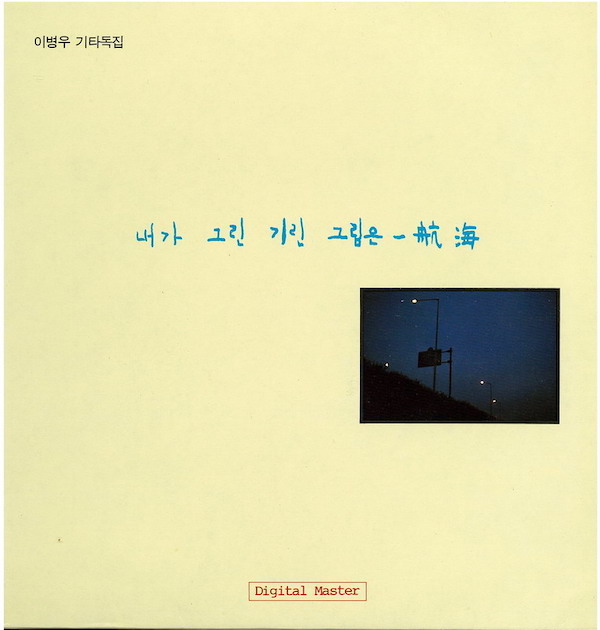
I’m glad we’ve gotten hints of the special work Lee Byung-Woo has done quietly behind the scenes in his native Korea. I wager some of you’ve already heard his music soundtracking Bong Joon-Ho’s brilliant films like The Host and Mother. Somewhere lost to our shores has been Lee Byung-Woo’s earlier trailblazing career. 1989’s 1집 – 내가 그린 기린 그림은 -航海 I believe gives you a wonderful piece of that larger portrait. A heady mix of instrumental guitar jazz, ambient, new age, and folk music, it has all the personal slivers of ideas hiding underneath his other work.
For many in Korea Lee Byung-Woo’s notoriety doesn’t come from his soundtracks or solo work but from his earlier years in the mid ‘80s as guitarist for one-half of folk duo Someday with bassist Cho Dong-ik. Performing tirelessly (and perhaps) with little fanfare around their native Seoul, the duo created a unique fusion of jazz, rock, and Western singer-songwriting that resonated with the sensibilities of younger audiences growing tired of stale Korean pop music.

On albums like I 1960.1965 and II, they created something others dubbed “Quiet Wave” to signify their deep lyrical prowess combined with quiet sonic experimentation. Future larger names like Kim Hyun Sik, Kim Hyun Chul, and You Hee-yeol have stated elsewhere the influence the duo had on their own sojourns away from contemporary Korean pop. After 1989, unwilling to perform or bastardize their songs on TV, and choosing to pursue other creative ventures, the duo split up. They already felt they’ve gone too soft on their sophomore release.
Cho Dong-ik would go on to be this quietly influential writer and producer behind the scenes for artists like FOND/SOUND favorites like Jang Pil-Soon, Yasha, and Park Hak-ki, artists who’d drive Korea’s semi-indie music scene through labels like Kim Hyun Chul’s Donga and the now shifty SRB Records. Lee Byung-Woo would take a different route and sign with SRB records to create a jazz record of sorts.
1집 – 내가 그린 기린 그림은 -航海, if you’d ask Lee, would be an inbetween record. Just a year removed from his self-imposed venture away from Korea into Austria. Here lay a record where he wasn’t entirely this Korean guitar master he’d later come to be. Here Lee Byung-Woo creates a very slowly churning, quiet, and graceful record that appears to speak intimately towards his connection with the urbane and hidden things of a rapidly changing Seoul.
Hearing 1집 – 내가 그린 기린 그림은 -航海 one wouldn’t be quite offbase to hear strains of influences from the work of Pat Metheny and other ambient jazz guitarists. However, while Metheny’s work is tinged with a connection to rural America, once again, the difference here is that Lee’s debut sounds like a night ride through that shifting landscape between city and rural life.
Completely written on all sorts of guitars — classical, acoustic, electric, and guitar synth — and featuring a single polysynth, “economical” would be the right word to describe Lee’s debut. “새” takes cues from the pastoral guitar instrumentals of guitarists like Pierre Bensusan or other open-tuned English folkies. Opening with such a number, a meditative short one, instantly puts you in that reflective mood.
My favorite track “내가 그린 기린 그림은 – 航海” continues on a different gradient. Here multi-layered guitars (some harmonic, others as chorus) build a gorgeous nocturnal mood seemingly dangling its feet right above some dock at Eurwangni Beach before dropping off and letting trumpets bring you through another atmosphere.
Over the span of 39 minutes, largely guitar-led instrumentals, strike their plaintive plucks as they will on “사랑했지만” and “사랑했지만”, only to give way to beams of blue starlit wonders like “머플리와 나는 하루종일 바닷가에서” that sound like yearning sighs of the simple promises from earlier experimentations. Perfectly suited for late summer nights, tracks like that one barely contain Lee’s urge to sing with it, communing wordlessly with his personal rhythms.

1집 – 내가 그린 기린 그림은 -航海 ends on a distillation of two sonorities: one electronic the other acoustic. “4月”’s doppler-like unwinding allows Lee to probe even further the power of space between notes in this elegiac tune. “이젠 안녕” then just drops all pretense and goes for a quick instrumental ballad sending you home with a lullaby that can figure out whether it wants to go to bed or walk just one more block. Surely, we can take a few minutes to meet him there here?
